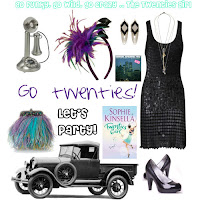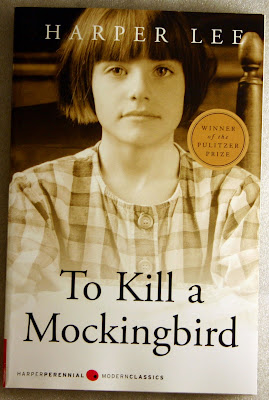This definitely isn't Sophie Kinsella's best, and it took me a while to get into it. Sophie Kinsella's books are known to be fun and filled with ridiculosity, but this one took it to another level.
About 'Twenties Girl', I would say, a well linked and well versed story-piece which explores human relationships. Though there was certainly a lack of typical author's humour missing in this book also but it was well made up by the extensiveness of the story or rather how it appeals to oneself.
In Twenties Girl, Lara Lington attends the funeral of her 105-year-old great-aunt, Sadie Lancaster, whom she never knew. Then all of a sudden, Sadie's ghost, at the age of 23-years-old, appears to Lara. Lara is the only one who can hear or see Sadie. Sadie begs Lara to stop the funeral and to help her find her dragonfly necklace.
I initially thought the storyline of the ghost bothering Lara was annoying and too ridiculous. I also didn't think it was very original since I've read/watched other stories involving a ghost that only certain people can see. If this book hadn't been written by Sophie Kinsella, I may not have even finished it.

But THEN, it started to get more interesting and Lara became involved in many funny and typical of Kinsella scenarios. Sadie was also an interesting character and the mischief the two engage in is hilarious. There is also a side plot that I realized later into the reading and it all came together in the end and wrapped up well. I grew to really like the two characters. There were moments when I laughed out loud and other heartwarming moments, as I mentioned earlier.
While, I wouldn't necessarily recommend this book as one of the first of Kinsella's to read, those who are already fans of hers will definitely find a hint of her typical humor and fun in this novel!
For a 410 paged novel its definitely one that can keep you hang on to it long enough for your interest in it, even you quite don't exactly reach that level of appreciation in the end, you still find your time worth while.
About 'Twenties Girl', I would say, a well linked and well versed story-piece which explores human relationships. Though there was certainly a lack of typical author's humour missing in this book also but it was well made up by the extensiveness of the story or rather how it appeals to oneself.
In Twenties Girl, Lara Lington attends the funeral of her 105-year-old great-aunt, Sadie Lancaster, whom she never knew. Then all of a sudden, Sadie's ghost, at the age of 23-years-old, appears to Lara. Lara is the only one who can hear or see Sadie. Sadie begs Lara to stop the funeral and to help her find her dragonfly necklace.
I initially thought the storyline of the ghost bothering Lara was annoying and too ridiculous. I also didn't think it was very original since I've read/watched other stories involving a ghost that only certain people can see. If this book hadn't been written by Sophie Kinsella, I may not have even finished it.

But THEN, it started to get more interesting and Lara became involved in many funny and typical of Kinsella scenarios. Sadie was also an interesting character and the mischief the two engage in is hilarious. There is also a side plot that I realized later into the reading and it all came together in the end and wrapped up well. I grew to really like the two characters. There were moments when I laughed out loud and other heartwarming moments, as I mentioned earlier.
While, I wouldn't necessarily recommend this book as one of the first of Kinsella's to read, those who are already fans of hers will definitely find a hint of her typical humor and fun in this novel!
For a 410 paged novel its definitely one that can keep you hang on to it long enough for your interest in it, even you quite don't exactly reach that level of appreciation in the end, you still find your time worth while.












